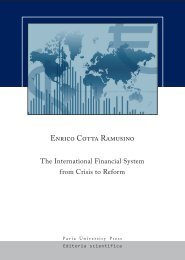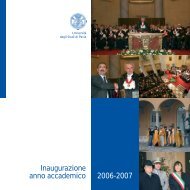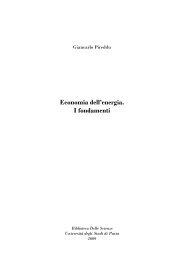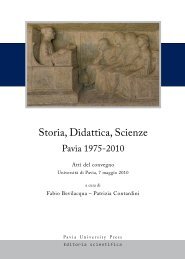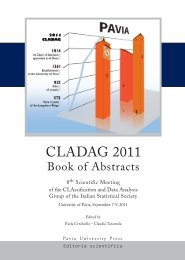The Palestinian Economy. Theoretical and Practical Challenges
The Palestinian Economy. Theoretical and Practical Challenges
The Palestinian Economy. Theoretical and Practical Challenges
You also want an ePaper? Increase the reach of your titles
YUMPU automatically turns print PDFs into web optimized ePapers that Google loves.
Proceedings “<strong>The</strong> <strong>Palestinian</strong> <strong>Economy</strong>: <strong>The</strong>oretical <strong>and</strong> <strong>Practical</strong> <strong>Challenges</strong>” 315<br />
children’s status. First, closures are expected to affect children belonging to households<br />
whose father is employed in Israel: the closure of borders causes a sudden <strong>and</strong><br />
unanticipated drop in the household earnings. According to the luxury axiom (Basu <strong>and</strong><br />
Van, 1998) the reduction in the household income should increase child labour <strong>and</strong><br />
reduce school attendance. But closures are also expected to affect children’s status<br />
through the modification of the local labour market conditions. Repeated incidence of<br />
closure encourages returning workers to look for local jobs reducing local (<strong>and</strong> regional)<br />
market wage. From a theoretical point of view, a change in latter is predicted to have two<br />
opposite effects on child labour (<strong>and</strong> school attendance): the income <strong>and</strong> the substitution<br />
effect. It is an empirical question which of these effects prevails. <strong>The</strong> conflict situation<br />
thus implies that households – either directly or indirectly affected by the mobility<br />
restrictions – may decide to have their children working <strong>and</strong> leaving school. Obviously<br />
this would be more likely the less the household is able to cope with the worsening of the<br />
economic conditions or to smooth consumption during temporary shocks.<br />
Our results show that the intensity of the conflict – measured by the number of<br />
closure days – increases the probability of child labour <strong>and</strong> marginally reduces school<br />
attendance. <strong>The</strong>se results are robust to the inclusion of a number of controls <strong>and</strong> also to<br />
alternative econometric specifications. <strong>The</strong> magnitude of the effect is not negligible: a 10<br />
days increase in the quarterly number of closure days increases the probability of child<br />
labour by 11%. We also provide some evidence on the possible channels through which<br />
the conflict affects child labour <strong>and</strong> school attendance. Our estimates indicate that an<br />
increase in the number of closure days decreases local market wages, household income<br />
<strong>and</strong> the probability of father being employed in Israel while it increases the number of<br />
unemployed in the household. While all of them are possible channels through which the<br />
conflict increases child labour <strong>and</strong> decreases school attendance, our results suggest that<br />
the worsening of the local labour market condition is the most relevant one.<br />
Two are the main contributions of our paper to literature. To the best of our<br />
knowledge, this is the first paper that describes the determinants of child labour <strong>and</strong><br />
school attendance in West Bank. In doing so, we use a unique dataset obtained by<br />
merging information from the <strong>Palestinian</strong> Labour Force Survey <strong>and</strong> separate data on 10-<br />
14 years old children, both provided by the <strong>Palestinian</strong> Central Bureau of Statistics<br />
(PCBS). As far as we know, it is also the first paper to study the effect that a conflict may<br />
have – through its impact on the local economic conditions – on child labour. Our results<br />
indeed suggest the existence of additional (probably unintended) social costs related to





